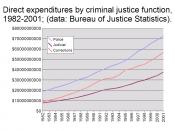Nils Christie's book "Crime Control As Industry" discusses various aspects of common sense and how it is used for justice, behavior control, modernity, among others. People around the world have the same basic problem concerning crime control and the delivery of pain administered. However, they all go about fixing this particular problem very differently. Ideas that people believe are common sense in the United States, may be beyond imagination or not desired in other countries.
Societies have dispensed an extraordinary variety of disciplinary responses to behaviors seen as immoral, irregular or just a social nuisance. In Saudi Arabia if someone steals something, as a form of pain delivery they might have their right hand chopped off. This would remind them daily for the rest of their life about their past criminal activity. However, in New Zealand, if the same act were committed rehabilitation would be the method of correction.
In New Zealand criminal behavior and its treatment is seen as a group responsibility. The criminal, his family, the victim and their family, a court supervisor, social worker and other specialists get together to decide on a suitable response, including some kind of compensation that satisfies all parties concerned. This shows that the pain delivery system in New Zealand is lower than other countries. Both of these prior responses for a similar crime probably seem like "common sense" to the countries involved. However, in the United States removing a person's hand is cruel and unusual punishment; it would put a hardship on the person involved and the social services that would have to help support this criminal in the future. On the other hand, bringing together the victim, social services, and the criminal at a meeting to decide the type of punishment that satisfies all involved may seem a bit...


